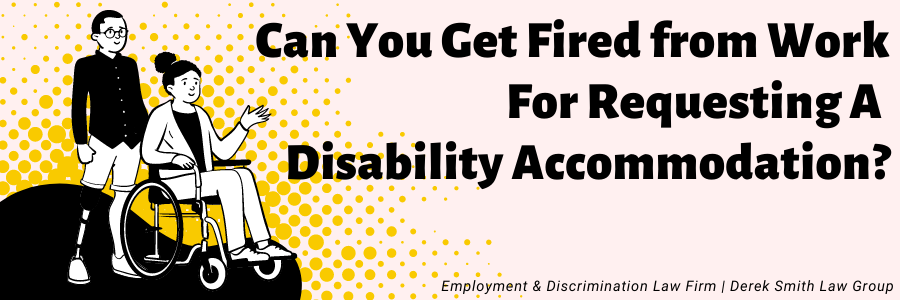What Are Your Rights to Reasonable Accommodations Under Disability Discrimination Laws?

The law defines a disability as a medical condition that inhibits your ability to perform one or more daily functions. Disabilities can relate to physical health conditions or mental health conditions. They can place severe limitations on your ability to move about the day. However, they can also play minor limitations on your ability to complete tasks throughout your day.
Sometimes, individuals with disabilities will need adjustments to their workplace to help them get through the day. In some cases, they need access to a ramp or wider aisles around the office to allow a wheelchair or walker to get through. In other cases, they may need a schedule change or change to their duties to accommodate specific needs and medical restrictions. Sometimes, they must carry specific equipment to help them get through the day.
An employer has a duty to provide an employee with reasonable accommodations within the workplace to ensure they can continue to work. When your employer cannot provide the accommodations, they must find an alternative option to accommodate your needs. You cannot get fired from work instead of receiving an accommodation for your disability.
Read on to learn more about your rights to reasonable accommodations in the workplace.
What Are Considered Reasonable Accommodations for Disabilities within the Workplace?
A reasonable accommodation for disabilities within the workplace can be any number of changes to the workplace. In some extreme cases, you may ask your employer to widen aisles throughout the office so you and your wheelchair can get through. You may ask for an office space in the front of the office, so you do not need to widen the aisles to get through.
In some cases, you may need to adjust your schedule so you can get to and from work without assistance. Perhaps you cannot drive in the dark. Therefore, you need to adjust your schedule to allow you to come and go when the sun is out. In other cases, you may need to request time off from work to receive specific medical treatments or attend regular doctor appointments.
Sometimes, your requested accommodations are even less intrusive than the above-mentioned changes. For instance, your employer may only need to allow you to carry a water bottle with you throughout the day. Maybe you need an ergonomic keyboard to avoid muscle cramps. Maybe a bigger computer screen will help you see what you are working on.
Reasonable accommodations are changes that your employer can make to your workstation or the workplace to allow you to complete your job. Without these accommodations, you may not be able to continue to work to your best ability.
What Happens If Your Employer Cannot Provide You an Accommodation?
In some cases, your employer may find it impossible to provide you with a particular accommodation. The requested accommodation may cause an undue hardship. An undue hardship occurs when an employer would be unable to operate their business or lose significant money by providing you with the accommodation.
However, claiming undue hardship does not mean that your employer can fire you from work or retaliate against you for being unable to work without the accommodation.
Instead, your employer must work with you to find an alternative accommodation that will allow you to work without costing them business. An alternative accommodation can help everyone succeed within the company while following disability discrimination laws.
What Can You Do If You Get Fired from Work Instead of Provided an Accommodation?
The federal and state disability laws protect you from getting fired from work instead of providing reasonable accommodations. Any form of retaliation for requesting reasonable accommodation breaks disability discrimination laws.
Therefore, if you get fired from work instead of receiving an accommodation, you have the right to seek legal help. A disability discrimination lawyer can help you hold your employer accountable for their actions.
First, your lawyer can help you understand your rights under the law. You have the right to file a claim against your employer in a federal or state court. Your lawyer will help you determine the best court or agency for your claim. They will help you file your claim within the proper time limit provided under the law.
Your lawyer can also help you request the compensation you deserve. In some cases, you may want monetary compensation as well as changes to the company’s policies and procedures to prevent this type of issue from occurring again. For instance, you may want your employer to conduct training regarding disabilities and accommodations to bring awareness to the issues that face disabled employees in the workplace.
Take Advantage of Your Employee Rights!
Your employer must understand your rights to reasonable accommodations for your disabilities. If they decide to fire you from work instead of providing you the accommodations you deserve, you have a right to fight back. The disability discrimination lawyers at the Derek Smith Law Group in New York City, New Jersey, Philadelphia, Miami, and Los Angeles can help. Call 800.807.2209 for a free consultation.

 Derek Smith
Derek Smith